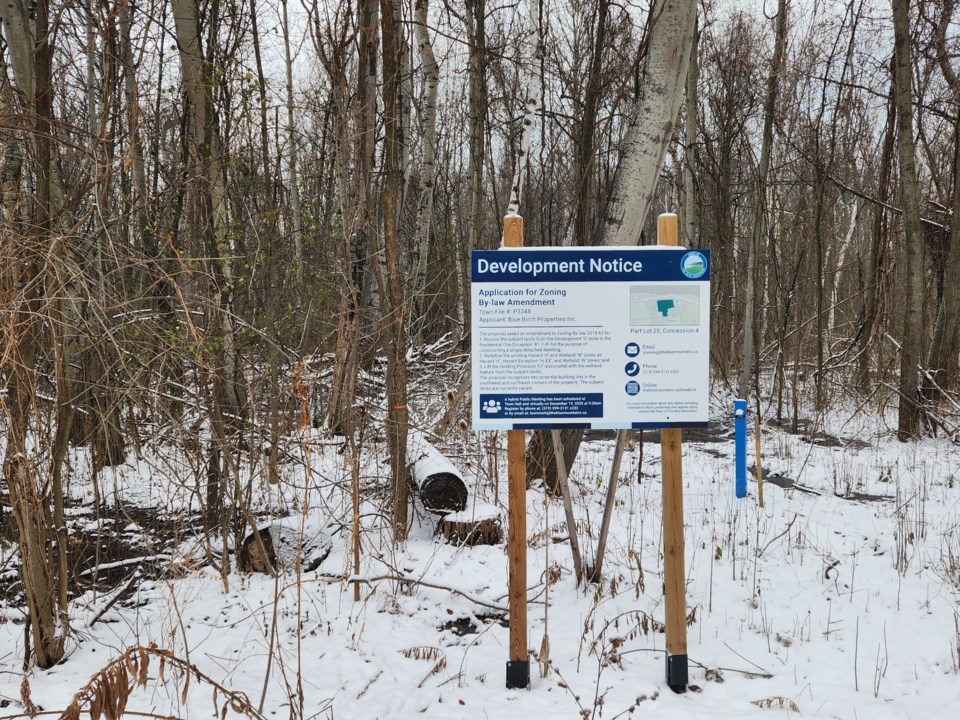The Blue Mountains council has received its first lesson in the new reality that has been created by the provincial government’s decision to tighten planning timelines.
And the lesson was not a good one.
At its committee of the whole meeting on Jan. 16, council rejected a rezoning application because there was not enough time, due to new provincial planning timelines, to address the concerns raised by a number of agencies that commented on the application.
The new rules require a council to make a decision on a planning application within 90 days of it being deemed complete. If a decision is not made in 90 days, the applicant can appeal and the municipality is required to refund any planning fees paid. That 90 days includes holidays and weekends.
Facing the end of the 90-day allowance, council refused the application, even with the proponent and his planning consultant attending the meeting to request the matter be deferred until they had time to address the concerns.
The matter involved a relatively straightforward planning application to rezone a property near Craigleith to create two separate building lots for a home (single detached dwelling) to be constructed.
Town planning staff deemed the application complete on Nov. 8, 2023, which started the clock ticking on the 90-day rule with a decision required by Feb. 6.
Council’s last regular meeting before that date is Jan. 29, which meant council had to debate and decide at its committee of the whole session on Jan. 16.
A public meeting on the application was held on Dec. 19 and at that time Grey County, Grey Sauble Conservation Authority and the Niagara Escarpment Commission expressed a number of environmental and drainage concerns about the proposal. Neighbouring property owners also expressed opposition to the rezoning application.
The tight time frame and holiday break meant the applicant – Ron Herczeg – and his planning consultants have not had any opportunity to address the concerns raised by the various agencies.
The situation left council facing the stark choice of turning down the rezoning or approving a deferral, which would have extended the time frame past the 90 days and required the town to refund the planning fees paid by the applicant. Both possibilities also created the chance of a costly appeal to the Ontario Land Tribunal.
“We’re not being put in a very good position at all,” said Coun. Paula Hope.
Mayor Andrea Matrosovs agreed and said the matter had come forward at a tough time of the year with the holiday break in the middle of the 90-day time frame.
“It’s unfortunate the 90-day rule isn’t recognizing business days,” she said.
Ironically the new 90-day rule, which was implemented by the Ford government to speed up the planning process to get more housing built faster, caused council to reject an application for a new home.
“It’s not anybody’s fault, it’s what has been mandated by our superior government,” said Coun. Shawn McKinlay.
During the debate, town planning staff said they were generally supportive of the application, but couldn’t recommend its approval without the comments and concerns by the other agencies being addressed by the applicant. Staff also acknowledged that the 90-day rule had created a difficult time crunch on the file, as some of the outside agency comments were not received until the day of the public meeting.
Sean Postma, manager of community planning, said the new rules implemented by Bill 109 had caused major issues in the planning world.
“It’s really sort of turned that process on its head,” said Postma. “There is little to no wiggle room to allow these extensions.”
Herczeg and his planning consultant Kristine Loft attended the meeting and requested a deferral until they had a chance to address the comments from the various agencies. They offered to waive the requirement to refund the planning fees if the 90-day threshold was not met.
Council rejected a motion to defer in a 2-3 vote with McKinlay and Coun. Alex Maxwell in favour and Coun. Gail Ardiel and Deputy Mayor Peter Bordignon absent. Council then voted 5-0 to refuse the application.
The rejection of the application led to Herczeg to denounce the decision during public comments a few minutes later. He called the decision “preposterous,” “completely unfair” and “extremely disappointing.”
Herczeg said he has been “working diligently” for two years on his proposal and did not want his planning fees refunded (which were over $4,000) – he wanted to address the concerns that had been raised by the county, conservation authority and NEC.
“I’ve never come across anything like this before,” said Herczeg. “I don’t want my money back. I just want to work together to address the comments. I don’t understand this decision at all.”
Throughout the lengthy discussion on the matter, town staff explained that the Planning Act does not have a framework for the town and developer to agree to waive a refund for the fees if the 90-day requirement is not met, although they did say they were aware that other municipalities have accepted such arrangements.
“It’s something that’s not been legally tested,” said Adam Smith, the town’s director of planning and development services.
Staff also told council that the proponent could come back to the town with a new application that includes their response to the concerns raised by the county and other agencies.
“There is nothing barring this from being resubmitted,” said planner Carter Triana.
Matrosovs also noted that the committee of the whole decision is preliminary and can be revisited at council’s full meeting on Jan. 29.



